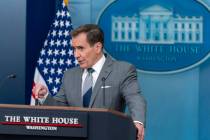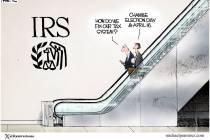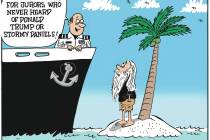Limited acquisitions of federal land would benefit Nevada
Nevada communities surrounded by extensive public lands find their local economies and way of life influenced profoundly by federal land management decisions. That is why I joined with the Nevada Association of Counties on Sept. 29 to host the Summit on Public Lands in Nevada.
The purpose of this event was to have a detailed and open conversation to identify opportunities and recommendations for Nevada to strengthen its role in the health, sustainability and management of our public lands. To that end, we invited a broad range of stakeholders to hear from Bureau of Land Management and U.S. Forest Service officials, and experts on rangeland science, land use, natural resources and economic development. There were frank discussions on how wildfires, access, multiple use and permitting processes are managed on our public lands and the effects they have on our communities. Summit attendees offered their thoughts and suggestions on how to ensure state and local perspectives are reflected in federal resource and forest management plans and implementation.
In a recent Review-Journal op-ed by my colleagues, state Sen. Kelvin Atkinson and Clark County Commissioner Chris Giunchigliani ("Federal lands should stay in federal hands," Oct. 16), it was suggested that this event was somehow connected to the extreme ideology of Cliven Bundy, an individual who has broken federal laws.
Both of my colleagues were invited to the summit, but chose not to attend. Had they attended, they would have learned that the summit was in fact a bipartisan discussion about how these lands can best be managed in partnership with multiple stakeholders. They would have learned the discussion focused on protecting our public lands, so that the ecology, health and economy of our state can also be protected for current and future generations. They would have, in fact, learned that only limited, but no less important, discussion took place regarding the transfer of public lands, despite their claims otherwise.
To set the record straight, out of seven academically and professionally accredited speakers, only one presented on a study involving a transfer of federal lands to the state. The study discussed does not advocate for a wholesale transfer of Nevada's public lands. It specifically excludes for consideration of transfer the lands currently designated for protection under federal laws such as national monuments, wilderness, critical habitat for endangered and threatened species, as well as other types of similarly protected land. The study is limited to acres that stakeholders believe should be disposed of, yet lack an efficient federal process to do so — specifically, parcels and tracts such as those already permitted for commercial use or identified for disposal by the federal government.
The study does not suggest that all transferred lands should be sold, nor does it suggest that local government revenues would decrease, because any revenues lost from Payment in Lieu of Taxes (PILT) would be replaced by state resources garnered from the management of any transferred lands. There is no proposed "seizure" of public lands in this study, nor was such a topic discussed at the summit.
For each of these challenges, however, there are solutions and positive examples that can guide us on improving the management of our lands and engaging more meaningfully in the collaborative process. It is my goal and the goal of those who participated in the summit to continue this discussion, and I would invite (as we did on Sept. 29) all stakeholders to participate. I am committed to working with our federal agencies to identify and respond to these pressing public lands management issues and furthering this conversation.
I encourage Sen. Atkinson and Commissioner Giunchigliani to join me in this effort. As Nevadans, we owe it to the people of the Silver State to act in their best interests and leave behind the talking points and outdated rhetoric that contribute to the political divide.
— Las Vegas attorney Mark Hutchison, a Republican, is Nevada's lieutenant governor.























